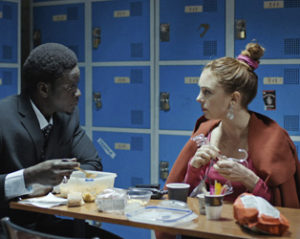
 (4.5 / 5)
(4.5 / 5)
Leonor Serraille’s terrific debut film, “Jeune Femme” also known as “Montparnasse Bienvenue” was shown at the 2017 Cannes Film Festival where it won the Camera D’Or award for best first feature.
The titles is a little incongruous in either of its two version. At 31, Paula, the heroine of the story is hardly a young girl. Montparnasse Bienvenue is the name of one of the busiest Metro stations in the Paris underground where a number of lines converge. However, nothing of note in the film happens here.
Maybe “Jeune Girl” is a reflection of Paula’s sometimes immature actions. And Montparnasse Bienvenue(Montparnasse Welcome (you) can be considered ironic, because there is little in terms of cinematography that is particularly welcoming in this film. In fact, for a film made in Paris, the director manages to make it look like any other inner city, with its functionality and ugliness. This represents Paula’s impression of the French capital which she dislikes. “I think Paris is a city that doesn’t like people” . Or possibly, “Montparnasse Bienvenue” with its confusing convergence of metro lines represents how complicated are everyday life is in the 21st century.
The film starts in a ferocious manner where we see Paula headbutting an apartment door in response to her requests for entry being disregarded.
Having injured her head, she attends hospital, and in a rare lengthy scene, we learn that she was trying to gain entry into her lover of ten year’s flat who has obviously wanted to end the relationship. Returning after this event to the flat she notices her ex-lover’s cat and decides to catnap it. Clutching this white furry ball to her chest, we witness Paula’s attempt to rebuild her life and the encounters she has along the way.
In a way, it is an anti-existential film. For Paula lives in the moment paying total disregard for consequences of her actions. Seeking a place to lay her head, (and the cat’s), she calls upon a friend who is prepared to put her up. However, the heavily pregnant friend makes a cutting remark about the cat, prompting Paula to ask whether she thinks she will make a fit mother. So, she and cat get promptly kicked out.
There is a very clever scene at Montparnasse Cemetery, where Paula finds an open tomb to shelter her cat from the rain. I don’t think it is a coincidence that at this cemetery you have buried John-Paul Sarte and his lover Simone de Beauvoir, probably the two greatest existentialists of the twentieth century. So living in the moment, she finds an open tomb a useful place to satisfy her needs at that time, whereas Sarte and de Beauvoir were useless remains – a remnant of the past.
She meets a girl who mistakes her for an old friend due to Paula’s heterochromia iridis – different coloured eyes. Excited by this, the girl takes her home to stay but Paula doesn’t think to tell her that in fact she wasn’t that friend, and this is only learned later on.
Looking for work, she takes on a job as a home help and childminder for a dance company director. At first, the little girl is serious and guarded, so with Paula being her inimitable self, it almost seems like role reversal. But gradually the girl takes to Paula and they establish a relationship which appears to open up a new world for the strictly brought up child. Whether the reason is that the mother is jealous of Paula’s easygoing relationship with her daughter, or something else, she decides to look for a replacement.
Paula also takes a ship in a Knicker Bar section of a department store. It is only a temporary job, (but that isn’t going to phase Paula). and she takes to it well. She establishes a friendly relationship with an Afro French security guard for the mall whether the store is located. He is a steady guy who you think might act as a rudder for Paula’s spontaneous lifestyle.
Eventually we are introduced to Paula’s ex Joachim, (Grégoire Monsaingeon), who is a professor and intellectual, in contrast to Paula, who by her own admission states that she is not very clever. Joachim is older than Paula and it would seem that she may be attracted to older men due to her father being missing in her life. Joachim now wants to get back together with Paula, and this desire is intensified when he learns that Paula is pregnant with his child. He comes across as being a supercilious and condescending man who comes close to sexually assaulting Paula when she turns down his advances.
Paula is estranged from her mother – we don’t know the reason other than her mother complains that she is always leaving. She literally pushes her away and when Paula breaks into her mother’s home, there is a poignant scene when she is clinging on to the banister with both arms and legs as her mother tries to push her out. However, there does seem to be some acceptance after this on the part of the mother, but we don’t know how long this will last.
Along the way, the director provides some social comment. At the knicker bar where Paula works, each girl has to be dress uniformly and provide a branded look in their personal appearance. Therefore they walk around the store like mindless clones. During a lunch break when she is talking to her friend, Ousmane, the security guy, she is reminded in her ear-piece that breaks are for only 30 minutes not 35, reminding us of the “Big Brother” environment that often plagues the modern workplace. Ousmane has a degree in economics but is working in security. Maybe this is down to his ethnic origin.
The film is a triumph for Laetitia Dosch as Paula. She is in every scene of the movie and gives a totally uninhibited and honest portrayal of a woman who just gets on with her life and deals with problematic situations as they arise without guarding against them.
Through the skill of director Léonor Serraille, we view the movie in the moment also. It is very unusual in that way – it immerses you into Paula’s lifestyle which typifies modern living – especially in the great metropoles of the world. I’m tempted to say that it is a film about alienation and isolation – there is an early references to Barentsburg, a settlement on the Norwegian island of Svalbard, (formerly Spitzbergen) and located north of the Artic Circle. You can’t get much more isolated than that. Alienation and isolation are a factor, but I think this film is more a testament of Paula’s ability to overcome her difficulties and it leaves a surprisingly uplifting effect on you.
This movie won’t be to everyone’s taste, but if you like offbeat comedy-drama, in the classic French New Wave style, then I can recommend it unreservedly.
“Jeune Femme” has finished its short run at Chapter Cinema 1, but can still be found at selected locations in the U.K.
County: France
Language: French with English subtitles
Duration: 97 minutes
Cert. 15 for mild nudity and occasional strong language and sexual threat.
Roger Barrington



